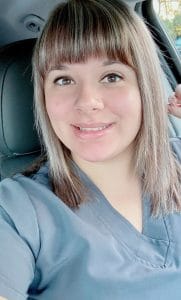PUBLISHED: 10th November 2020

by La'Shae Wilson
Note: November is Native American Heritage month
I was born into the Chitimacha Band of Indians of Houma, Louisiana. I have always been proud of being Native American, but it was not until I started high school that I was able to get closer to my heritage and learn more about my ancestors. I was raised in southern Alabama and loved visiting my Cajun family, learning more about who I am and enjoying Cajun cuisine.
I was working in an OB-GYN clinic in 2019 when I started learning more about hereditary cancer and how family history can give you an insight about the kinds of serious health issues you could have. That is when I started asking my own questions. When it came to health problems in my family, older generations only spoke of someone having this or that cancer, never anything about hereditary cancer or cancer genes. In a small town like mine, not many people know about hereditary cancer, or signs that mean that the cancer in their family could be hereditary.
I learned that my paternal grandmother had cancer when she was 27 or 28 years old, so did her mother, my paternal great grandmother. I also found out that my grandfather on my mother’s side had pancreatic cancer, as did his mother. Knowing my family history raised the question of whether I should be tested to have peace of mind. I figured I would have a negative result, and all would be right in the world. So, I got my blood work done with a company that ran a full panel. Waiting for my results made me anxious, until they arrived about one week later.
The doctor I worked for, who had become a good friend, sat me down in her office and gave me my result: Positive for a pathogenic BRCA1 gene mutation,” otherwise known as Hereditary Breast and Ovarian Cancer Syndrome. I wasn’t sure what to think. Cancer is the leading cause of death among Native Americans, so learning that I had genetic predisposition was especially overwhelming. We have a greater cancer burden than most other people in the U.S. We are more likely to have underlying conditions that contribute to cancer, yet in general, we have less access to health care and health insurance coverage.
I had so many questions. I was so afraid of what this meant for myself, my two girls, and my husband. I cried and cried as I drove home. I had assumed my test would be negative; instead I opened a can of worms. From there, I made several doctors’ appointments. My breast oncologist recommended I see a dermatologist to have my moles, which I have had for as long as I can remember, finally evaluated. The dermatologist removed two moles that looked irregular; one came back as melanoma in situ. I probably would have never gone otherwise, and the melanoma then could have spread and been so much worse.
Learning I carry a BRCA 1 mutation has been a blessing in disguise. It has given me the knowledge and power to be more informed about the care I receive, though it took a little while for me to get to this point. Once I could accept what this meant, I devoted some of my free time to learning more about HBOC and asking questions. That is when I found FORCE. It gave me the support and resources I needed to get the best care I could ever need, and so many other topics I did not even know to ask about. FORCE has also opened several opportunities for me. I signed up to be a Peer Navigator, Research Advocate, and Message Board Moderator. Which opened even more opportunities for me with other organizations. While having BRCA1 can be a burden and life-changing, it can also give you knowledge, and knowledge is power.
This journey hasn’t been easy. I still have a long way to go, including making decisions about surgery, what I want to do in the next few years, and which roads to go down. But I have a phenomenal support system that will be with me every step of the way. That is all I can ask for.
 La’Shae is a FORCE volunteer. She serves the FORCE community as a research advocate, message board moderator and peer navigator.
La’Shae is a FORCE volunteer. She serves the FORCE community as a research advocate, message board moderator and peer navigator.
POSTED IN: XRAY , Health Equity And Disparities , Previvor , Diversity And Inclusion
TAGS: Genetic Testing , BRCA1 , Previvor , HBOC
1 Comments
December 29, 2020
So powerfully written. Thank you for raising awareness and sharing your story.
Alexandra Weiss
Reply